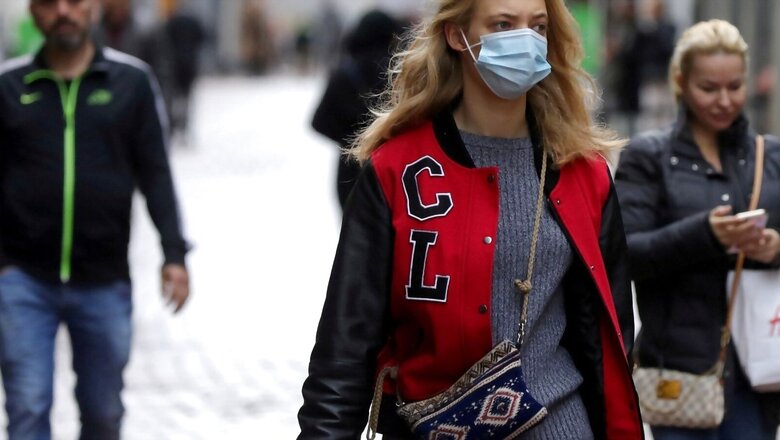
views
Europe has become the epicentre of the pandemic again, prompting some governments to consider re-imposing unpopular lockdowns in the run-up to Christmas and stirring debate over whether vaccines alone are enough to tame Covid-19.
The fresh concerns come as successful inoculation campaigns have plateaued ahead of the winter months and flu season.
About 65% of the population of the European Economic Area (EEA) – which includes the European Union, Iceland, Liechtenstein and Norway – have received two doses, according to EU data, but the pace has slowed in recent months.
Situation of ‘High Concern’ in 10 EU Countries
Ten countries in the 27-member European Union face a Covid situation of “high concern”, the bloc’s diseases agency said on Friday, warning the pandemic was worsening across the continent. Belgium, Bulgaria, Croatia, the Czech Republic, Estonia, Greece, Hungary, the Netherlands, Poland and Slovenia are in the highest category of concern, according to the latest risk assessment by the European Centre for Disease Control.
Countries That Have Imposed Lockdowns, Tightened Restrictions
1. Netherlands: In the Netherlands, bars and restaurants will close early and sporting events will be held without audiences under a three-week partial lockdown that will be Western Europe’s first since the summer and that is expected to be announced on Friday evening.
2. Germany: The country will reintroduce free COVID-19 tests from Saturday, acting health minister Jens Spahn said on Friday. A draft law in Germany would allow for measures such as compulsory face masks and social distancing in public spaces to continue to be enforced until next March.
3. Austria: The Austrian government is likely to decide on Sunday to impose a lockdown on people who are not vaccinated, Chancellor Alexander Schallenberg said on Friday.
4. Latvia: Still struggling to ramp up shots, central and eastern European governments have had to take drastic action. Latvia, one of the least vaccinated countries in the EU, imposed a four-week lockdown in mid-October.
5. Czech Republic, Slovakia and Russia: The Czech Republic, Slovakia and Russia have also tightened restrictions. The Czech cabinet will consider on Friday whether fresh measures are needed.
6. Norway: The country will reintroduce nationwide measures to stem surging coronavirus cases, including authorising towns to use health passes, the government announced on Friday. The Nordic country, which had lifted all Covid-19 restrictions in late September, will also propose a third vaccine dose for people over 18 but will not impose a new lockdown, Prime Minister Jonas Gahr Store told a press conference. The new measures include a requirement for adults who have been in contact with a positive case to be tested, and unvaccinated health workers will have to be tested twice a week and wear masks.
7. Iceland: Iceland also tightened its Covid rules on Friday for the second time since the start of the month, after it hit new records in daily infection rates earlier this week. As of midnight, public gatherings will be limited to 50 people instead of the previous 500 on the island of some 375,000 inhabitants. Swimming pools and sports halls will only be allowed to operate at 75 percent capacity. Eighty-nine percent of Iceland’s inhabitants aged over 12 have been vaccinated. Around 36,000 of those have received a booster shot, and the government hopes to give 160,000 more people a third jab by the end of the year.
Vaccine Passports, Face Masks Reinforced
Vaccines alone are not the silver bullet to defeat the pandemic in the long term, virologists say. Several pointed to Israel as an example of good practice: in addition to inoculations, it has reinforced mask wearing and introduced vaccine passports after cases spiked a few months ago. Measures such as spacing, masks and vaccine mandates for indoor venues are essential, said Antonella Viola, professor of immunology at Italy’s University of Padua. “If one of these two things is lacking, we see situations such as we are seeing in many European countries these days.”
Vaccine Hesitancy, Waning Immunity Part of Problem
Europe accounts for more than half of the average 7-day infections globally and about half of latest deaths, according to a Reuters tally, the highest levels since April last year when the virus was at its initial peak in Italy. Take-up in southern European countries is around 80%, but hesitancy has hampered rollout in central and eastern Europe and Russia, leading to outbreaks that could overwhelm healthcare.
To be sure, hospitalisations and deaths are much lower than a year ago and big variations by country in use of vaccines and boosters as well as measures like social distancing make it hard to draw conclusions for the whole region.
But a combination of low vaccine take-up in some parts, waning immunity among those inoculated early and complacency about masks and distancing as governments relaxed curbs over the summer are likely to blame, virologists and public health experts told Reuters.
10% Increase in Deaths
The World Health Organization’s report for the week to November 7 showed that Europe, including Russia, was the only region to record a rise in cases, up 7%, while other areas reported declines or stable trends.
Similarly, it reported a 10% increase in deaths, while other regions reported declines. Governments and companies are worried the prolonged pandemic will derail a fragile economic recovery, and a slew of countries are taking measures to curb the spread.
Booster Shots
Most EU countries are deploying extra shots to the elderly and those with weakened immune systems, but expanding vaccination to more of the population should be a priority to avoid steps like lockdown, scientists said. “The real urgency is to widen the pool of vaccinated people as much as possible,” said Carlo Federico Perno, head of microbiology and immunology diagnostics at Rome’s Bambino Gesù Hospital.
The EU’s medicines regulator is also evaluating the use of Pfizer and BioNTech’s vaccine in 5 to 11-year-olds.
Norway will offer a third COVID-19 vaccine dose to everyone aged 18 and older and will give municipalities the option of using digital “corona passes”, the government said on Friday. Norway has so far given a third dose only to those aged 65 and older.
From December 1, Italy will also offer the third dose to people over 40. “This (outbreak) will probably make the EU look at booster doses and say ‘we do need them pronto’,” said Michael Head, senior research fellow in global health at the University of Southampton.
Read all the Latest News here




















Comments
0 comment